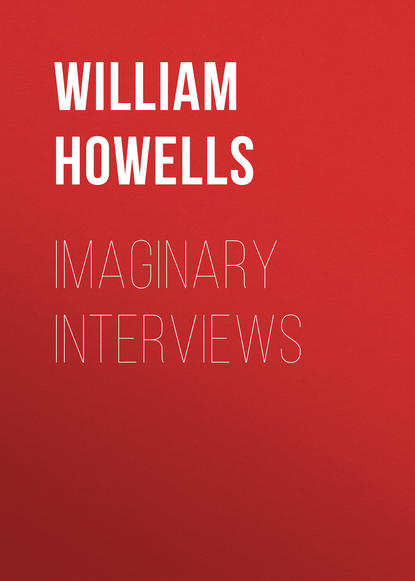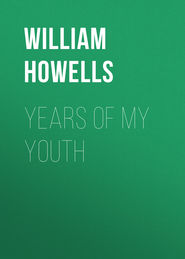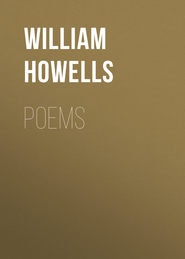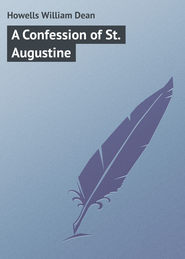По всем вопросам обращайтесь на: info@litportal.ru
(©) 2003-2024.
✖
Imaginary Interviews
Настройки чтения
Размер шрифта
Высота строк
Поля
'To bless and never to ban.'"
"Very likely, on the low society level on which our joint life moved," our other self replied, with his unsparing candor. "You know we were a country village, city-of-the-second-class personality. Even in the distant epoch painted in the Potiphar Papers the motives of New York society were the same as now. It was not the place where birth and rank and fame relaxed or sported, as in Europe, or where ardent innocence played and feasted as in the incorrupt towns of our interior. If Curtis once represented it rightly, it was the same ridiculous, hard-worked, greedy, costly, stupid thing which Mr. Pulitzer again represents it."
"And yet," we mused aloud, "this is the sort of thing which the 'unthinking multitude' who criticise, or at least review, books are always lamenting that our fiction doesn't deal with. Why, in its emptiness and heaviness, its smartness and dulness, it would be the death of our poor fiction!"
"Well, I don't know," our counterpart responded. "If our fiction took it on the human ground, and ascertained its inner pathos, its real lamentableness, it might do a very good thing with those clubmen and society girls and grandes dames. But that remains to be seen. In the mean time it is very much to have such a study of society as Mr. Pulitzer has given us. For the most part it is 'satire with no pity in it,' but there's here and there a touch of compassion, which moves the more because of its rarity. When the author notes that here and there a pretty dear finds herself left with no one to take her out to supper at the ball, his few words wring the heart. 'These poor victims of their sex cannot, like the men, form tables of their own. All that each can do is to disappear as swiftly and as secretly as possible, hurrying home in humiliation for the present and despair for the future.'"
"Do such cruel things really happen in our best society?" we palpitated, in an anguish of sympathy.
"Such things and worse," our other self responded, "as when in the german the fair débutante sees the leader advancing toward her with a splendid and costly favor, only to have him veer abruptly off to bestow it on some fat elderling who is going to give the next ball. But Mr. Pulitzer, though he has these spare intimations of pity, has none of the sentiment which there is rather a swash of in the Potiphar Papers. It's the difference between the Mid-Victorian and the Early Edwardian point of view. Both satirists are disillusioned, but in the page of Curtis there is
'The tender grace of a day that is dead'
and the soft suffusion of hope for better things, while in the page of Mr. Pulitzer there is no such qualification of the disillusion. Both are enamoured of the beauty of those daughters of Mammon, and of the distinction of our iron-clad youth, the athletic, well-groomed, well-tailored worldlings who hurry up-town from their banks and brokers' offices and lawyers' offices to the dinners and opera-boxes and dances of fashion. 'The girls and women are of a higher average of beauty than any European ball-room could produce. The men, too, are generally well built, tall, and handsome, easily distinguishable from the waiters,' Mr. Pulitzer assures us."
"Well, oughtn't that to console?" we defied our other self. "Come! It's a great thing to be easily distinguishable from the waiters, when the waiters are so often disappointed 'remittance men' of good English family, or the scions of Continental nobility. We mustn't ask everything."
"No, and apparently the feeding is less gross than it was in Curtis's less sophisticated time. Many of the men seem still to smoke and booze throughout the night with the host in his 'library,' but the dancing youth don't get drunk as some of them did at Mrs. Potiphar's supper, and people don't throw things from their plates under the table."
"Well, why do you say, then, that there is no change for the better in our best society, that there is no hope for it?"
"Did I say that? If I did, I will stick to it. We must let our best society be as it now imagines itself. I don't suppose that in all that gang of beautiful, splendid, wasteful, expensively surfeited people there are more than two or three young men of intellectual prowess or spiritual distinction, though there must be some clever and brilliant toadies of the artist variety. In fact, Mr. Pulitzer says as much outright; and it is the hard lot of some of the arts to have to tout for custom among the vulgar ranks of our best society."
"Very well, then," we said, with considerable resolution, "we must change the popular ideal of the best society. We must have a four hundred made up of the most brilliant artists, authors, doctors, professors, scientists, musicians, actors, and ministers, with their wives, daughters, and sisters, who will walk to one another's dinners, or at worst go by trolley, and occupy the cheaper seats at the opera, and dance in small and early assemblages, and live in seven-room-with-bath flats. Money must not count at all in the choice of these elect and beautiful natures. The question is, how shall we get the dense, unenlightened masses to regard them as the best society; howteach the reporters to run after them, and the press to chronicle their entertainments, engagements, marriages, divorces, voyages to and from Europe, and the other facts which now so dazzle the common fancy when it finds them recorded in the society intelligence of the newspapers?"
"Yes, as General Sherman said when he had once advocated the restriction of the suffrage and had been asked how he was going to get the consent of the majority whose votes he meant to take away – 'yes, that is the devil of it.'"
We were silent for a time, and then we suggested, "Don't you think that a beginning could be made by those real élite we have decided on refusing to let associate with what now calls itself our best society?"
"But hasn't our soi-disant best society already made that beginning for its betters by excluding them?" our other self responded.
"There is something in what you say," we reluctantly assented, "but by no means everything. The beginning you speak of has been made at the wrong end. The true beginning of society reform must be made by the moral, æsthetic, and intellectual superiors of fashionable society as we now have it. The grandes dames must be somehow persuaded that to be really swell, really smart, or whatever the last word for the thing is, they must search Who's Who in New York for men and women of the most brilliant promise and performance and invite them. They must not search the banks and brokers' offices and lawyers' offices for their dancing-men, but the studios, the editorial-rooms, the dramatic agencies, the pulpits, for the most gifted young artists, assignment men, interviewers, actors, and preachers, and apply to the labor-unions for the cleverest and handsomest artisans; they must look up the most beautiful and intelligent girl-students of all the arts and sciences, and department stores for cultivated and attractive salesladies. Then, when all such people have received cards to dinners or dances, it will only remain for them to have previous engagements, and the true beginning is made. Come! You can't say the thing is impossible."
"Not impossible, no," our complementary self replied. "But difficult."
XIV
THE MAGAZINE MUSE
Two aging if not aged poets, one much better if not much older than the other, were talking of the Muse as she was in their day and of the Muse as she is in this. At the end, their common mind was that she was a far more facile Muse formerly than she is now. In other words, as the elder and better poet put it, they both decided that many, many pieces of verse are written in these times, and hidden away in the multitude of the magazines, which in those times would have won general recognition if not reputation for the authors; they would have been remembered from month to month, and their verses copied into the newspapers from the two or three periodicals then published, and, if they were not enabled to retire upon their incomes, they would have been in the enjoyment of a general attention beyond anything money can buy at the present day. This conclusion was the handsomer in the two poets, because they had nothing to gain and something to lose by it if their opinion should ever become known. It was in a sort the confession of equality, and perhaps even inferiority, which people do not make, unless they are obliged to it, in any case. But these poets were generous even beyond their unenvious tribe, and the younger, with a rashness which his years measurably excused, set about verifying his conviction in a practical way, perhaps the only practical way.
He asked his publishers to get him all the American magazines published; and has the home-keeping reader any notion of the vastness of the sea on which this poet had embarked in his daring exploration? His publishers sent him a list of some eighty-two monthly periodicals in all kinds, which, when he had begged them to confine it to the literary kind, the æsthetic kind only, amounted to some fifty. By far the greater number of these, he found, were published in New York, but two were from Philadelphia, one from Boston, one from Indianapolis, and one even from Chicago; two were from the Pacific Slope generally. That is to say, in this city there are issued every month about forty-five magazines devoted to belles-lettres, of varying degrees of excellence, not always connoted by their varying prices. Most of them are of the ten-cent variety, and are worth in most cases ten cents, and in a few cases twenty-five or thirty-five cents, quite like those which ask such sums for themselves. The cheapest are not offensive to the eye altogether, as they lie closed on the dealer's counter, though when you open them you find them sometimes printed on paper of the wood-pulp, wood-pulpy sort, and very loathly to the touch. Others of the cheapest present their literature on paper apparently as good as that of the dearest; and as it is not always money which buys literary value, especially from the beginners in literature, there seemed every reason for the poet to hope that there would be as good poetry in the one sort as in the other. In his generous animation, he hoped to find some good poetry on the wood-pulp paper just as in the Golden Age he might have found it carved by amorous shepherds on the bark of trees.
He promised himself a great and noble pleasure from his verification of the opinion he shared with that elder and better poet, and if his delight must be mixed with a certain feeling of reserved superiority, it could hardly be less a delight for that reason. In turning critic, the friendliest critic, he could not meet these dear and fair young poets on their own level, but he could at least keep from them, and from himself as much as possible, the fact that he was looking down on them. All the magazines before him were for the month of January, and though it was possible that they might have shown a certain exhaustion from their extraordinary efforts in their Christmas numbers, still there was a chance of the overflow of riches from those numbers which would trim the balance and give them at least the average poetic value. At this point, however, it ought to be confessed that the poet, or critic, was never so willing a reader as writer of occasional verse, and it cannot be denied that there was some girding up of the loins for him before the grapple with that half-hundred of magazines. Though he took them at their weakest point, might they not be too much for him?
He fetched a long breath, and opened first that magazine, clarum et venerabile nomen, from which he might reasonably expect the greatest surprises of merit in the verse. There were only two pieces, and neither seemed to him of the old-time quality, but neither was such as he would himself have perhaps rejected if he had been editor. Then he plunged at the heap, and in a fifteen-cent magazine of recent renown he found among five poems a good straight piece of realistic characterization which did much to cheer him. In this, a little piece of two stanzas, the author had got at the heart of a good deal of America. In another cheap magazine, professing to be devoted wholly to stories, he hoped for a breathing-space, and was tasked by nothing less familiar than Swift's versification of a well-known maxim of La Rouchefoucauld. In a ten-cent magazine which is too easily the best of that sort, he found two pieces of uncommon worth, which opened the way so promisingly, indeed, for happier fortunes that he was not as much surprised as he might later have been in finding five poems, all good, in one of the four greater, or at least dearer, magazines. One of these pieces was excellent landscape, and another a capital nature piece; if a third was somewhat strained, it was also rather strong, and a fourth had the quiet which it is hard to know from repose. Two poems in another of the high-priced magazines were noticeable, one for sound poetic thinking, and the other as very truthfully pathetic. The two in a cheap magazine, by two Kentucky poets, a song and a landscape, were one genuinely a song, and the other a charming communion with nature. In a pair of periodicals devoted to outdoor life, on the tamer or wilder scale, there were three poems, one celebrating the delights of a winter camp, which he found simple, true in feeling, and informal in phrasing; another full of the joy of a country ride, very songy, very blithe, and original; and a third a study of scenery which it realized to the mind's eye, with some straining in the wording, but much felicity in the imagining. A Mid-Western magazine had an excellent piece by a poet of noted name, who failed to observe that his poem ended a stanza sooner than he did. In a periodical devoted to short stories, or abandoned to them, there were two good pieces, one of them delicately yet distinctly reproducing certain poetic aspects of New York, and giving the sense of a fresh talent. Where the critic would hardly have looked for them, in a magazine of professed fashion and avowed smartness, he came upon three pieces, one sweet and fine, one wise and good, one fresh and well turned. A newer periodical, rather going in for literary quality, had one fine piece, with a pretty surprise in it, and another touched with imaginative observation.
The researches of the critic carried him far into the night, or at least hours beyond his bedtime, and in the dreamy mood in which he finally pursued them he was more interested in certain psychological conditions of his own than in many of the verses. Together with a mounting aversion to the work, he noted a growing strength for it. He could dispatch a dozen poems in almost as many minutes, and not slight them, either; but he no longer jumped to his work. He was aware of trying to cheat himself in it, of pretending that the brief space between titles in the table of contents, which naturally implied a poem, sometimes really indicated a short bit of prose. He would run his eye hastily over an index, and seek to miss rather than find the word "poem" repeated after a title, and when this ruse succeeded he would go back to the poem he had skipped with the utmost unwillingness. If his behavior was sinful, he was duly punished for it, in the case of a magazine which he took up well toward midnight, rejoicing to come upon no visible sign of poetry in it. But his glance fell to a grouping of titles in a small-print paragraph at the bottom of the page, and he perceived, on close inspection, that these were all poems, and that there were eighteen of them.
He calculated, roughly, that he had read from eighty-five to a hundred poems before he finished; after a while he ceased to take accurate count as he went on, but a subsequent review of the magazines showed that his guess was reasonably correct. From this review it appeared that the greater number of the magazines published two poems in each month, while several published but one, and several five or seven or four. Another remarkable fact was that the one or two in the more self-denying were as bad as the whole five or seven or nine or eighteen of those which had more freely indulged themselves in verse. Yet another singular feature of the inquiry was that one woman had a poem in five or six of the magazines, and, stranger yet, always a good poem, so that no editor would have been justified in refusing it. There was a pretty frequent recurrence of names in the title-pages, and mostly these names were a warrant of quality, but not always of the author's best quality. The authorship was rather equally divided between the sexes, and the poets were both young and old, or as old as poets ever can be.
When the explorer had returned from the search, which covered apparently a great stretch of time, but really of space, he took his notes and went with them to that elder friend of his whose generous enthusiasm had prompted his inquiry. Together they looked them over and discussed the points evolved. "Then what is your conclusion?" the elder of the two demanded. "Do you still think I was right, or have you come to a different opinion?"
"Oh, how should I safely confess that I am of a different opinion? You would easily forgive me, but what would all those hundred poets whom I thought not so promising as you believed do to my next book? Especially what would the poetesses?"
"There is something in that. But you need not be explicit. If you differ with me, you can generalize. What, on the whole, was the impression you got? Had none of the pieces what we call distinction, for want of a better word or a clearer idea?"
"I understand. No, I should say, not one; though here and there one nearly had it – so nearly that I held my breath from not being quite sure. But, on the other hand, I should say that there was a good deal of excellence, if you know what that means."
"I can imagine," the elder poet said. "It is another subterfuge. What do you really intend?"
"Why, that the level was pretty high. Never so high as the sky, but sometimes as high as the sky-scraper. There was an occasional tallness, the effect, I think, of straining to be higher than the thought or the feeling warranted. And some of the things had a great deal of naturalness."
"Come! That isn't so bad."
"But naturalness can be carried to a point where it becomes affectation. This happened in some cases where I thought I was going to have some pleasure of the simplicity, but found at last that the simplicity was a pose. Sometimes there was a great air of being untrammelled. But there is such a thing as being informal, and there is such a thing as being unmannerly."
"Yes?"
"I think that in the endeavor to escape from convention our poets have lost the wish for elegance, which was a prime charm of the Golden Age. Technically, as well as emotionally, they let themselves loose too much, and the people of the Golden Age never let themselves loose. There is too much Nature in them, which is to say, not enough; for, after all, in her little æsthetic attempts, Nature is very modest."
The elder poet brought the younger sharply to book. "Now you are wandering. Explain again."
"Why, when you and I were young – you were always and always will be young – "
"None of that!"
"It seemed to me that we wished to be as careful of the form as the most formal of our poetic forebears, and that we would not let the smallest irregularity escape us in our study to make the form perfect. We cut out the tall word; we restrained the straining; we tried to keep the wording within the bounds of the dictionary; we wished for beauty in our work so much that our very roughness was the effect of hammering; the grain we left was where we had used the file to produce it."
"Was it? And you say that with these new fellows it isn't so?"
"Well, what do you say to such a word as 'dankening,' which occurred in a very good landscape?"
"One such word in a hundred poems?"
"One such word in a million would have been too many. It made me feel that they would all have liked to say 'dankening,' or something of the sort. And in the new poets, on other occasions, I have found faulty syntax, bad rhymes, limping feet. The editors are to blame for that, when it happens. The editor who printed 'dankening' was more to blame than the poet who wrote it, and loved the other ugly word above all his other vocables." The elder poet was silent, and the other took fresh courage. "Yes, I say it! You were wrong in your praise of the present magazine verse at the cost of that in our day. When we were commencing poets, the young or younger reputations were those of Stedman, of Bayard Taylor, of the Stoddards, of Aldrich, of Celia Thaxter, of Rose Terry, of Harriet Prescott, of Bret Harte, of Charles Warren Stoddard, of the Piatts, of Fitz James O'Brien, of Fitzhugh Ludlow, of a dozen more, whom the best of the newest moderns cannot rival. These were all delicate and devoted and indefatigable artists and lovers of form. It cannot do the later generation any good to equal them with ours."
"There is something in what you say." The elder poet was silent for a time. Then he asked, "Out of the hundred poems you read in your fifty magazines, how many did you say were what you would call good?"
His junior counted up, and reported, "About twenty-four."
"Well, don't you call that pretty fair, in a hundred? I do. Reflect that these were all the magazines of one month, and it is probable that there will be as many good poems in the magazines of every month in the year. That will give us two hundred and eighty-eight good poems during 1907. Before the first decade of the new century is ended, we shall have had eleven hundred and fifty-two good magazine poems. Do you suppose that as many good magazine poems were written during the last four years of the first decade of the eighteenth century? Can you name as many yourself?"
"Certainly not. Nobody remembers the magazine poems of that time, and nobody will remember the poems of the four years ending the present decade."
"Do you mean to say that not one of them is worth remembering?"
The younger poet paused a moment. Then he said, with the air of a cross-examined witness, "Under advice of counsel, I decline to answer."











